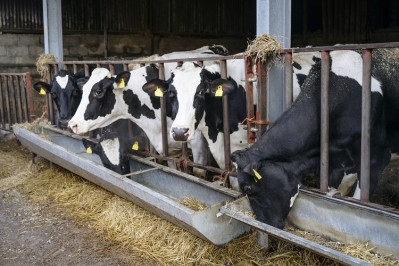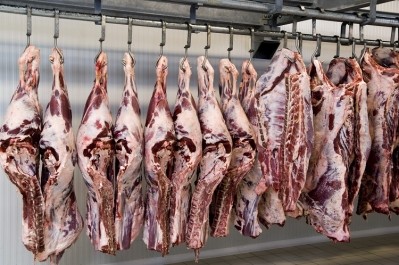Beef can stimulate muscle protein synthesis more effectively than plant-based proteins, says study

As our food system adapts to the demands imposed upon it by climate change, the amount of protein consumed from plant-based sources is likely to increase relative to those from animal-based ones. While there are many benefits to be gained from plant-based proteins, there may also be certain nutritional negatives. For example, according to a new study published in The Journal of Nutrition, muscle protein synthesis is higher following ingestion of a whole foods meal containing meat as primary source of protein, compared to a whole food plant-based protein meal.
Amino acids and muscle protein synthesis
In order to understand the outcomes of this study and their implementation, we must first understand the role and link between muscle protein synthesis and dietary protein.
“Our muscles are composed out of proteins, and these proteins are continuously being broken down (old/damaged/unnecessary proteins) and synthesised. As a result, every two to three months the proteins in our muscles are being renewed. This process is essential to keep our skeletal muscles healthy. In order to maintain and make muscle proteins, our body needs proteins from our diet. These proteins provide building blocks for the muscle proteins in the form of amino acids ,” Philippe Pinckaers, one of the authors of the study, told FoodNavigator.
“In total, there are 20 amino acids, some of which the body can make itself (called non-essential amino acids), some of which the body cannot make itself (called essential amino acids). In order to make muscle proteins we need a sufficient amount of all amino acids, but since the body cannot make the essential amino acids itself, it is important that we ingest a sufficient amount of it though our diet.”
The difference between plant and beef
The study, tested sixteen people, aged between 65 and 85, for their rates of muscle protein synthesis after eating either a vegan meal or a meal containing beef (through which most of the protein came from the beef). Both meals had exactly the same amount of protein and energy.
The results showed that the amount of essential amino acids in the blood were 127% greater after eating the meal with meat than the vegan meal. “Apart from some exceptions, plant-derived proteins often contain less essential amino acids in comparison to animal-derived proteins. Thus when the same amount of protein is ingested, less essential amino acids are ingested from the plant-derived source, and less will be available in the circulation,” Pinckaers told us.
Thereby, it also depends on how digestible the protein in question is. Even if a food contains the same amount of essential amino acids, if the digestibility is lower, less will become available into the blood. In general, plant based whole foods contain more fibres and other nutritional factors compared to animal-based protein foods, which makes them harder to digest.
Besides blood samples, this study also collected small pieces of muscle tissue from the volunteers to measure muscle protein synthesis rates. On average muscle protein synthesis rates were 47% higher when the participants had consumed the meal with beef, compared to the vegan meal. In fact, 12 out of the 16 participants showed a higher rate of muscle protein synthesis after eating the meal with beef compared to the vegan meal.
Potential solutions
While in this study meals with beef were more successful at stimulating muscle protein synthesis than vegan ones, this is due to a number of specific circumstances in the study. For example, the use of whole foods. There are a number of potential solutions to more effectively stimulate muscle protein synthesis that do not involve eating meat.
“Instead of consuming plant-based whole foods, one could use plant-protein isolates which are more easily digested and absorbed than whole foods. Thus amino acid availability increases. Although in practice this would then mean to supplement on top of the diet,” Pinckaers told us.
Furthermore, “one could fortify the ingested protein source with their limiting essential amino acids. This is not very practical for consumers, but has been used by manufacturers of meat analogues, ensuring a sufficient amount of all amino acids available in a single serving.”
Pinckaers also suggests eating a wider variety of proteins, or simply consuming a greater amount of plant-based proteins, both of which could go a way to solving the problem.
Young and old
Finally, Pinckaers points out the importance of age in muscle protein synthesis. "It is relevant to note that the results of this study do not mean everyone needs to eat meat or animal products. Healthy young individuals are very responsive to protein intake, and when ingesting a sufficient amount of protein, either protein source could be sufficient. Although, as demonstrated by this study, it becomes more complicated for older individuals, or frail patients. These individuals respond less to protein ingestion, and would need to ingest more protein to sufficiently stimulate muscle protein synthesis. However, in reality they eat less. Especially in combination with reduced amounts of physical activity (for example hospitalisation) it is of importance to stimulate muscle protein synthesis as effectively as possible to support muscle health, which for these populations is with animal-derived proteins."
This study was funded in part by meat industry consumer organisation The Beef Checkoff and meat producer Vion Food Group.
Sourced From: The Journal of Nutrition
'Higher Muscle Protein Synthesis Rates Following Ingestion of an Omnivorous Meal Compared with an Isocaloric and Isonitrogenous Vegan Meal in Healthy, Older Adults’
Published on: 14 November 2023
Doi: https://doi.org/10.1016/j.tjnut.2023.11.004
Authors: P. J. M. Pinckaers, J. Domi, H. L Petrick, A. M. Holwerda, J. Trommelen, F. K. Hendriks, L. H. P. Houben, J. P. B. Goessens, J. M. X. van Kranenburg, J. M. Senden, L. C. P. G. M. de Groot, L. B. Verdijk, T. Snijders, L. J. C. van Loon
























